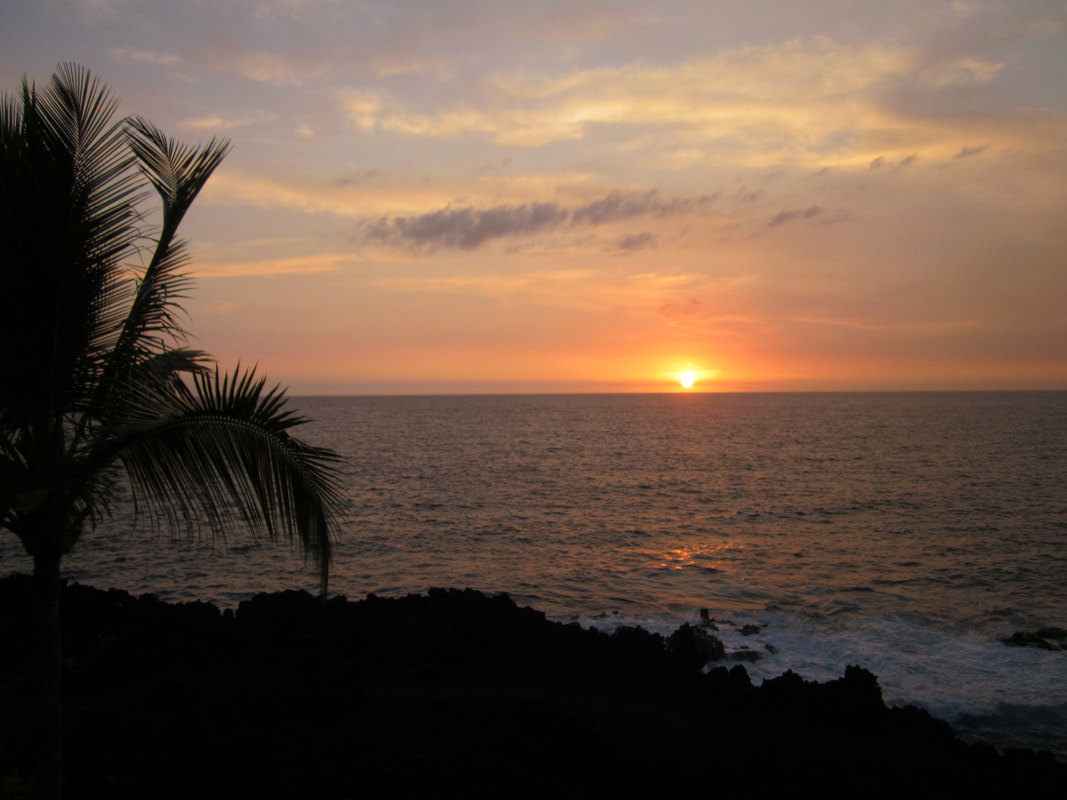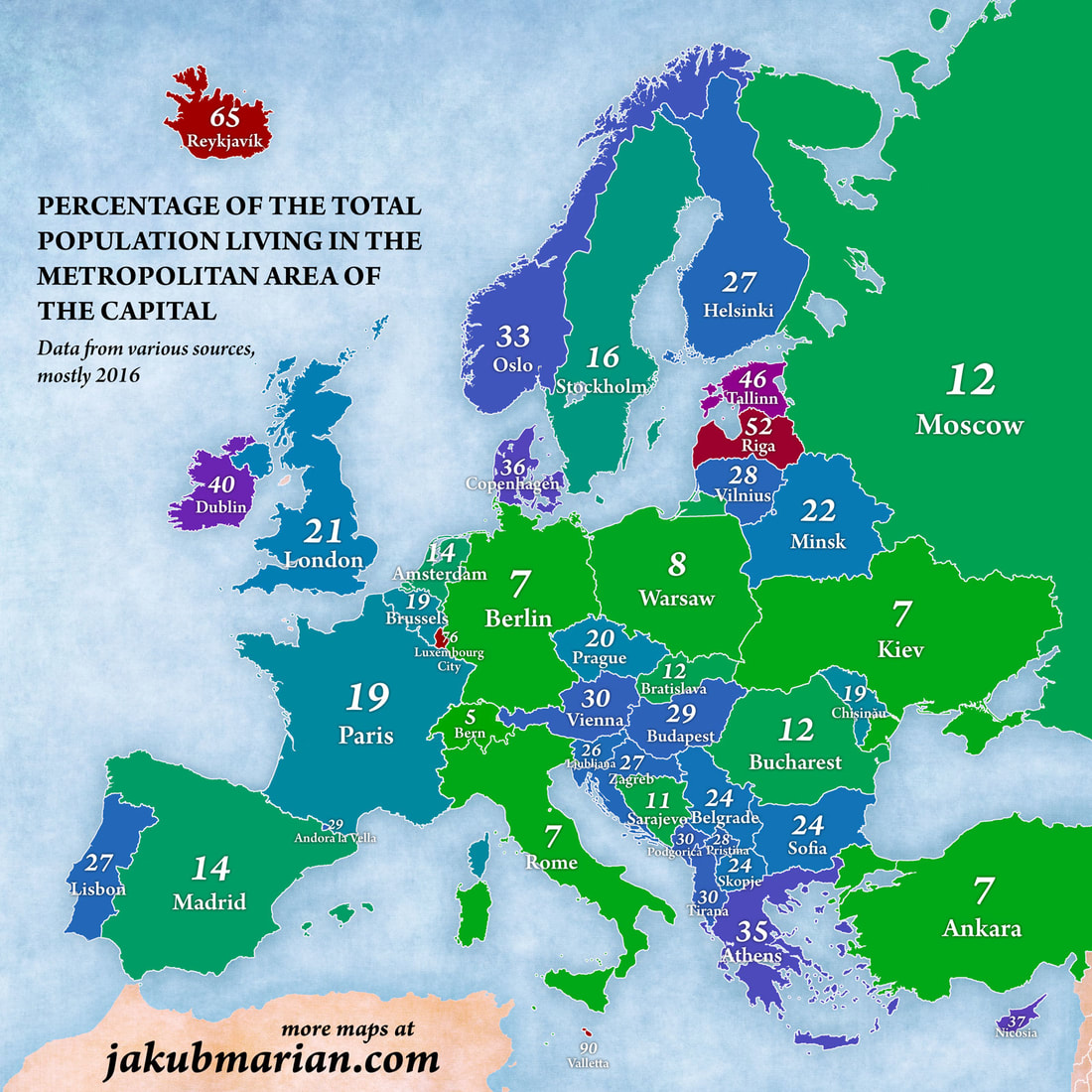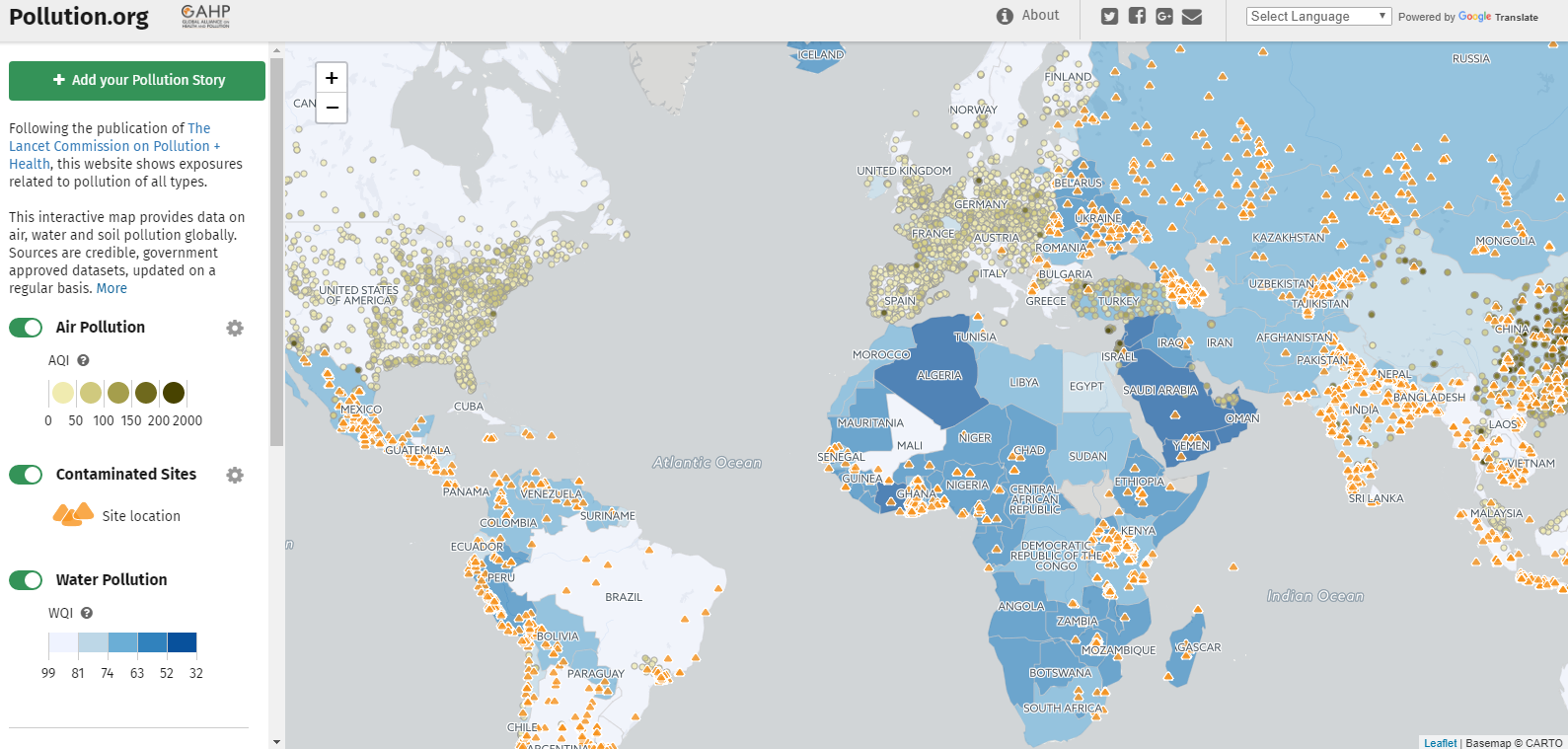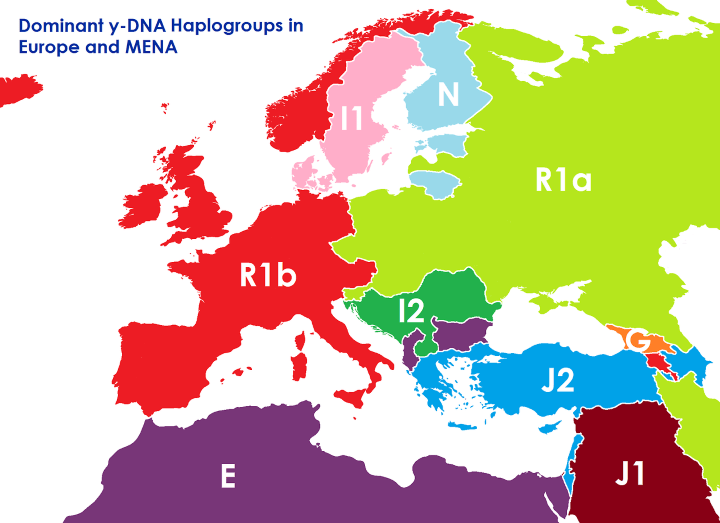|
I'll be out exploring a corner of the world for the next couple of weeks and do not expect to be posting to my blog or Facebook page much, if at all, during that time.
0 Comments
High school students are invited to apply for the Smithsonian's free (!) five-week programs in forensic botany, forensic anthropology, or forensic ornithology. Applications are due by Jan. 9; evening/weekend classes begin the week of Jan. 22. For all the details, see qrius.si.edu/teachers/youth-programs/after-school#/-1/
This map compares European countries by how much of their national population lives in their capital city or its surrounding metro area. As might be expected, small countries (like Malta, 90%, and Luxembourg, 76%) and countries with dominant primate cities (like Reykjavik, Iceland, Athens, Greece, and Olso, Norway) have a high concentration of population in the capital area. jakubmarian.com/wp-content/uploads/2017/12/capital-percentage-europe.jpg
2017 has seen the effective end of ISIS as a territory-holding entity. But what's happened to the people (mostly but not exclusively men) who left their home countries to join ISIS? This interesting and data-rich (if a bit confusing) graphic tries to tell that story in a single image: black lines show the flow of people towards ISIS (29,148 foreign fighters) and yellow lines show the flow of ISIS fighters back to their home countries (2,799 returnees). The size of the pale rhombuses represents each country's Muslim population, and the pinker that rhombus is, the higher the proportion of its citizens who left to join ISIS. iibawards-prod.s3.amazonaws.com/projects/images/000/002/323/large.png?1505503818
The black pepper we eat today is actually not the black pepper that spurred the spice trade more than 2,000 years ago. This interesting article looks at the reasons why Europeans switched from one Indian pepper to another. (Geographically relevant hint: sea routes result in cheaper goods than overland routes.) www.atlasobscura.com/articles/how-black-pepper-won-europe-from-a-better-pepper
Welcome to the North Pole! This planar map provides a different perspective on the Arctic than a customary equator-centered map does. As the Arctic is heating up, literally, Arctic politics are also heating up, with conflict over shipping lanes, fishing rights, mineral rights, and militarization emerging between the eight countries bordering the Arctic Ocean as well as with indigenous peoples (including elves?). www.wolfram.com/mathematica/new-in-10/geographic-visualization/HTMLImages.en/map-the-north-pole-and-arctic-circle/O_11.png
How does alcohol consumption affect moral decision making? A study conducted among bargoers in Grenoble, France, found that the higher a person's blood alcohol level, the more likely he or she would be to throw the switch in the trolley problem, killing one person to save five. Does that mean inebriation turns people into utilitarians? Or that alcohol shuts down social cognition circuitry, reducing concern for the one to be sacrificed? Or just that higher-order cognition is impaired and ethical decision-making when inebriated comes down to "going for it" and hoping everything works out? Regardless of the reason, the study suggests alcohol consumption affects not only motor skills and reaction times but also the ethical choices we would make even if our motor skills and reaction times were not impaired. www.theatlantic.com/health/archive/2014/10/the-cold-logic-of-drunk-people/381908/
This interactive mapping site seeks to document pollution problems globally. www.pollution.org/
Looking for some brain candy to keep those gears turning over the holidays? Kids (even those kids who don't particularly like math) and adults (including those who once knew all this but have forgotten it!) will enjoy "12 Days of Pascal's Triangle": theconversation.com/the-12-days-of-pascals-triangular-christmas-21479
This map, based on data from the Heritage Foundation, ranks countries based on their "economic freedom," which is defined here as low taxes, open trade policies, and few impediments to starting a business. cdn.howmuch.net/articles/1-world-map-b37c.jpg
The McKinsey Global Institute recently released a report looking at how automation and artificial intelligence may affect employment, by job and by country, by 2030. They estimate that up to 375 million people, or 14% of the global workforce, will have to move out of their current occupational categories to find paid work by 2030 (based on McKinsey's midpoint estimate of automation adoption). For advanced economies, the job dislocation is likely to be higher: McKinsey estimates that one-third of workers in the U.S. and Germany and nearly half of Japanese workers may have to find new jobs by 2030, forcing significant leadership decisions about education, transition and re-training policies, and social benefits, among others. www.mckinsey.com/global-themes/future-of-organizations-and-work/what-the-future-of-work-will-mean-for-jobs-skills-and-wages
Central Italy, northeast of Rome, is the site of the world's tallest artificial waterfall, Cascata delle Marmore. Even more impressive than its 541 foot drop (more than 3x the height of Niagara Falls) is the fact that it was built by the Romans more than 2,250 years ago, in 271 BC. www.atlasobscura.com/places/cascata-delle-marmore-marmore-falls
This map looks at homeownership among millennials (those born between roughly 1977 and 1995) in major U.S. metropolitan areas. Millennial homeownership is considered by some to be a proxy for a region's economic vitality, but it's also clear (and hardly surprising) that there is an inverse relationship between average home prices (pink=high, blue=low) and the proportion of millennials who own homes. howmuch.net/articles/millennial-homeownership-large-cities
Consciousness is a central concern to philosophers who specialize in the philosophy of mind. A new paper, on which the excerpt below is based, challenges our beliefs about the meaning of consciousness:
"Everyone knows what it feels like to have consciousness: it’s that self-evident sense of personal awareness, which gives us a feeling of ownership and control over the thoughts, emotions and experiences that we have every day. Most experts think that consciousness can be divided into two parts: the experience of consciousness (or personal awareness), and the contents of consciousness, which include things such as thoughts, beliefs, sensations, perceptions, intentions, memories and emotions. It’s easy to assume that these contents of consciousness are somehow chosen, caused or controlled by our personal awareness – after all, thoughts don’t exist until until we think them. "But ... [we] suggest that our personal awareness does not create, cause or choose our beliefs, feelings or perceptions. Instead, the contents of consciousness are generated 'behind the scenes' by fast, efficient, non-conscious systems in our brains. All this happens without any interference from our personal awareness, which sits passively in the passenger seat while these processes occur. Put simply, we don’t consciously choose our thoughts or our feelings – we become aware of them. "If this sounds strange, consider how effortlessly we regain consciousness each morning after losing it the night before; how thoughts and emotions – welcome or otherwise – arrive already formed in our minds; how the colours and shapes we see are constructed into meaningful objects or memorable faces without any effort or input from our conscious mind. ... "[A]s a passive accompaniment to non-conscious processes, we don't think that the phenomenon of personal awareness [the experience of consciousness] has a purpose, in much the same way that rainbows do not. Rainbows simply result from the reflection, refraction and dispersion of sunlight through water droplets -- not of which serves any particular purpose." theconversation.com/what-if-consciousness-is-not-what-drives-the-human-mind-86785 Using satellite data, this website maps information pertaining to the world's croplands: web.croplands.org/app/map?lat=23.60426&lng=22.587890625000004&zoom=4 The map below shows where croplands exist, but at the site users can also find information on cropland per capita, the percentage of a country's land that is cropland, irrigated vs. rainfed cropland, etc.
In advance of today's home school geography bee, I have spent some time this week playing with free geography apps. The two I like best? Geography Quiz by Peaksel (Android/iOS) and Geo Bee Now by Vishaal Ganesh (Android). The Peaksel app has, in addition to quiz questions, a photo and a brief explanation to support each answer. (The downside: there's an ad every few questions.) The Geo Bee Now app offers three levels of play, and the questions reflect a broad range of geographic subjects, similar to the National Geographic Society's geography bee. If you have a favorite geography app, please add it in the comments.
This map considers the dominant Y-DNA haplogroup (passed from father to son) across Europe, the Middle East, and North Africa. brilliantmaps.com/europe-dna-borders/
Many countries in southern Africa have harnessed the region's rivers to bring hydroelectric power to their people. But an extended drought is leaving some of them in the dark. Malawi, for example, recently experienced a total blackout when water levels at the country's two main hydroelectric dams dropped below electricity-generating levels. Zambia and Zimbabwe are facing similar problems. While investment in African hydro power remains high -- Ethiopia and Sudan have major (and controversial) Nile hydroelectric projects in the works -- other countries are turning to small-scale solar projects for electricity. This article from the BBC (UK) discusses an initiative to install solar panels in rural Rwanda: "As they [the founders of BBOXX, a London-based company that brings off-grid electricity to the developing world] explored various ways to get power to [rural Rwanda], they realised that the grid will never supply those in Rwanda and beyond who currently lack electricity: such communities are dispersed over immense areas, and are too poor to afford such extensive infrastructure. That’s when they arrived at a grand idea: they concluded that Africa will largely bypass the grid and leapfrog over Europe and North America straight into solar – just as it did in skipping landlines, a rarity in rural Africa, in favour of cell phones." www.bbc.com/future/story/20171009-rural-rwanda-is-home-to-a-pioneering-new-solar-power-idea
Sea-level rise isn't the only thing causing flooding in coastal cities: in many cities, the land is literally sinking as drinking water is drained from underground aquifers. Jakarta, for example, is sinking by 6.7" per year due to subsidence. Inland areas like Mexico City and California's San Joaquin Valley are also sinking, differentially, causing major water infrastructure problems. This BBC (UK) article looks at subsidence and what communities can do to stop it. www.bbc.com/future/story/20171130-the-ambitious-plan-to-stop-the-ground-from-sinking
Our geography is sometimes shaped by extraterrestrial events. This map looks at known impact craters in North America. The Earth Impact Database provides information about each known impact -- where it is, when it occurred, how big it is -- not just in North America but around the world: www.passc.net/EarthImpactDatabase/Worldmap.html
This recent article from Science News caught my attention because it tied in perfectly with a discussion my students and I were having in my online science fiction class, but it is also an excellent example of contemporary discussions in bioethics:
"Until recently, that sort of fiddling with human DNA was only science fiction and allegory, a warning against a new kind of eugenics that could pit the genetic haves and have-nots against each other. At a symposium sponsored by the Hastings Center on October 26 before the World Conference of Science Journalists in San Francisco, ethicists and journalists explored the flip side of that discussion: whether parents have a moral obligation to make “better” babies through genetic engineering. ... For Julian Savulescu, an ethicist at the University of Oxford, the answer is yes. Parents are morally obligated to take steps to keep their children healthy, he says. That includes vaccinating them and giving them medicine when they’re ill. Genetic technologies are no different, he argues." https://www.sciencenews.org/blog/science-public/ethics-gene-editing-babies-crispr This interesting map considers the world's most isolated cities with a population over 100,000, based on their distance to the nearest city that also has a population of more than 100,000. The top two are American cities: Honolulu at #1 and Anchorage at #2. cityextremes.com/isolated.php
You can give the gift of history or geography this holiday season. Some of the things that score highest on the "cool!" meter with my geography students are foreign stamps and coins. You can buy foreign coins by the pound or start a stamp collection with supplies from local stamp and coin stores, including Coins of the Realm (Rockville) and Maryland Stamps & Coins (Bethesda).
The 2017 hurricane season is over, but this NASA video shows how this year's storm systems delivered not just wind and rain but also airborne particles, including sea salt and dust from the Sahara. www.youtube.com/watch?v=h1eRp0EGOmE The Institute for Economics & Peace has released its 2017 Global Terrorism Index. The good news: deaths due to terrorism dropped 13% globally between 2015 and 2016, including declines in Afghanistan, Nigeria, Pakistan, and Syria (which together, along with Iraq, accounted for 3/4 of all terrorism-related deaths). The bad news: more countries than ever before (77) reported at least one death due to terrorism in 2016, terrorist attacks against civilians were up 17% on the year, and certain countries have seen significant increases in terrorism-related deaths (a single-year increase of 40% in Iraq, an 8-fold increase in Egypt since 2002, a 16-fold increase in Turkey since 2002). The chart below shows the 10 most fatal terrorist attacks in 2016. For the full report, see visionofhumanity.org/app/uploads/2017/11/Global-Terrorism-Index-2017.pdf
|
Blog sharing news about geography, philosophy, world affairs, and outside-the-box learning
Archives
December 2023
Categories
All
|




 RSS Feed
RSS Feed